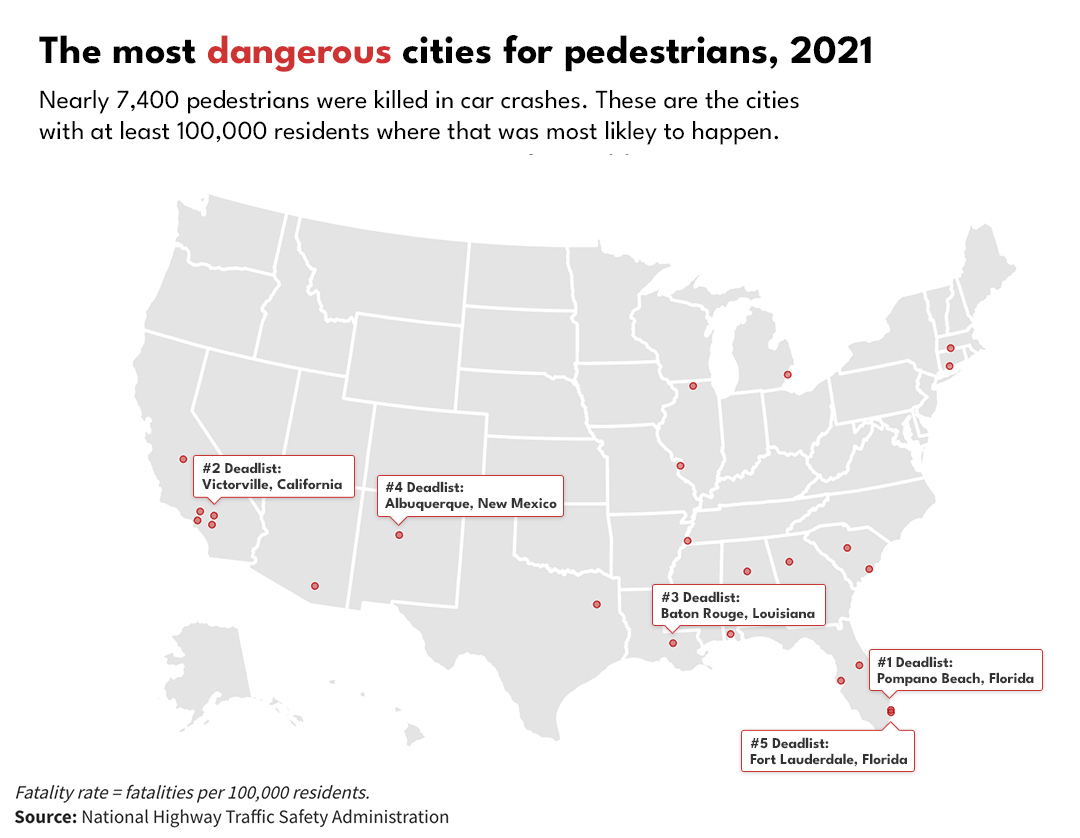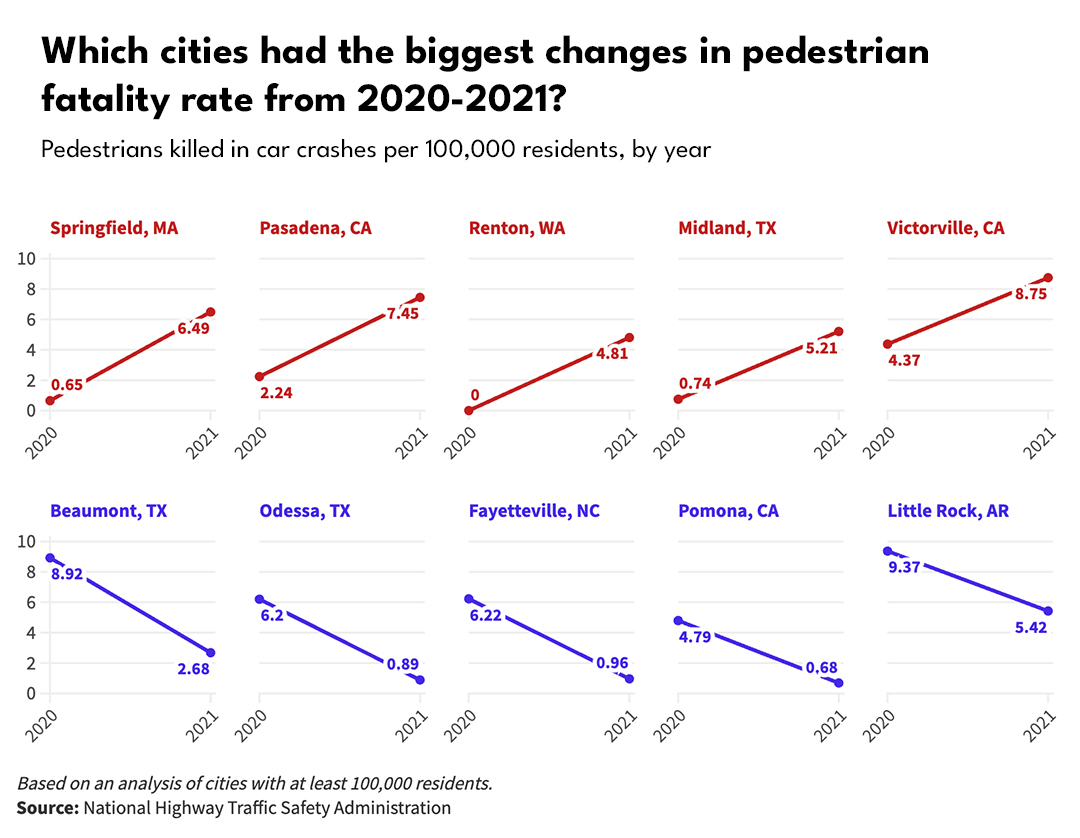The deadliest and safest cities for pedestrians

Canva
The deadliest and safest cities for pedestrians
Pedestrians crossing a busy intersection in a city
It’s dangerous out there if you’re a pedestrian. The number of pedestrians killed in car crashes has skyrocketed to more than 7,500, according to the Governors Highway Safety Association. Not only does that figure represent a 77% increase in pedestrian fatalities since 2010 — compared to 25% for all other traffic fatalities — but it’s the most pedestrians killed by cars since 1981.
To better understand the landscape when it comes to pedestrian safety, Miller & Hine analyzed data on pedestrian fatalities from the National Highway Traffic Safety Administration, looking at nearly 300 cities in 2020 and 2021.
Key findings
- In 287 cities with a population of at least 100,000, the total number of pedestrian fatalities increased by 17%, from 2,183 in 2020 to 2,552 in 2021.
- Pompano Beach, Florida, was the deadliest city for pedestrians on a per capita basis, with just under 9 fatalities per 100,000 residents in 2021.
- Lincoln, Nebraska; Durham, North Carolina; Plano, Texas; and North Las Vegas, Nevada, were the safest cities for pedestrians. Fewer than 0.4 pedestrians per 100,000 residents were killed in car crashes in all of those cities in 2021.
- Florida and California are confusing puzzles when it comes to pedestrian safety. The two large states are home to nine of the 25 deadliest cities on a per capita basis … and eight of the 25 safest cities.
![]()

Miller & Hine
Deadliest cities for pedestrians
A US map of the dangerous cities for pedestrians, 2021
NHTSA data identifies Pompano Beach, Florida—a city about 35 miles north of Miami—as the most dangerous city for pedestrians by fatality rate: 8.9 pedestrians were killed in car accidents per 100,000 residents in 2021; there were 10 total fatalities, and the city’s population is just over 112,000.
These are the 25 deadliest cities for pedestrians
- Pompano Beach, FL: 8.9 pedestrian fatalities per 100,000 residents in 2021
Up 0.89 fatalities (+11%) from 2020 - Victorville, CA: 8.75 pedestrian fatalities per 100,000 residents in 2021
Up 4.38 fatalities (+100%) from 2020 - Baton Rouge, LA: 8.58 pedestrian fatalities per 100,000 residents in 2021
Flat from 2020 - Albuquerque, NM: 8.56 pedestrian fatalities per 100,000 residents in 2021
Up 3.21 fatalities (+60%) from 2020 - Fort Lauderdale, FL: 8.19 pedestrian fatalities per 100,000 residents in 2021
Up 2.73 fatalities (+50%) from 2020 - San Bernardino, CA: 7.72 pedestrian fatalities per 100,000 residents in 2021
Up 3.18 fatalities (+70%) from 2020 - Memphis, TN: 7.57 pedestrian fatalities per 100,000 residents in 2021
Down -1.77 fatalities (-19%) from 2020 - Pasadena, CA: 7.45 pedestrian fatalities per 100,000 residents in 2021
Up 5.21 fatalities (+233%) from 2020 - Jackson, MS: 6.85 pedestrian fatalities per 100,000 residents in 2021
Down -3.42 fatalities (-33%) from 2020 - Tucson, AZ: 6.77 pedestrian fatalities per 100,000 residents in 2021
Up 1.1 fatalities (+19%) from 2020 - St. Louis, MO: 6.63 pedestrian fatalities per 100,000 residents in 2021
Flat from 2020 - Tampa, FL: 6.53 pedestrian fatalities per 100,000 residents in 2021
Up 3.27 fatalities (+100%) from 2020 - Springfield, MA: 6.49 pedestrian fatalities per 100,000 residents in 2021
Up 5.84 fatalities (+900%) from 2020 - New Haven, CT: 6.48 pedestrian fatalities per 100,000 residents in 2021
Flat from 2020 - Tyler, TX: 6.41 pedestrian fatalities per 100,000 residents in 2021
Up 3.66 fatalities (+133%) from 2020 - Atlanta, GA: 6.21 pedestrian fatalities per 100,000 residents in 2021
Up 2.4 fatalities (+63%) from 2020 - Rockford, IL: 6.13 pedestrian fatalities per 100,000 residents in 2021
Up 2.72 fatalities (+80%) from 2020 - Palmdale, CA: 6.12 pedestrian fatalities per 100,000 residents in 2021
Up 3.06 fatalities (+100%) from 2020 - Birmingham, AL: 6.09 pedestrian fatalities per 100,000 residents in 2021
Up 1.52 fatalities (+33%) from 2020 - Orlando, FL: 6.01 pedestrian fatalities per 100,000 residents in 2021
Up 2.85 fatalities (+90%) from 2020 - Mobile, AL: 6 pedestrian fatalities per 100,000 residents in 2021
Up 3.27 fatalities (+120%) from 2020 - Detroit, MI: 5.96 pedestrian fatalities per 100,000 residents in 2021
Up 0.96 fatalities (+19%) from 2020 - North Charleston, SC: 5.9 pedestrian fatalities per 100,000 residents in 2021
Up 0.84 fatalities (+17%) from 2020 - Columbia, SC: 5.73 pedestrian fatalities per 100,000 residents in 2021
Up 2.15 fatalities (+60%) from 2020 - Fresno, CA: 5.68 pedestrian fatalities per 100,000 residents in 2021
Up 0.55 fatalities (+11%) from 2020

Miller & Hine
The smaller cities on this list have higher rate-adjusted fatality rates than major cities
A chart showing the 5 deadliest cities by city size
Sixteen of the 25 deadliest cities in 2021 by fatality rate had a population somewhere between 100,000 and 250,000, even though only five cities with a population below 250,000 made the top 50 for total pedestrian fatalities.
Smaller cities tend to have bigger swings in rate-adjusted metrics like this. Los Angeles, the deadliest city in terms of total pedestrian fatalities, had more than 12 times as many deaths as Pompano Beach, but at 3.8 million residents, its population is roughly 34 times the size.
In fact, when we looked at these cities in smaller population buckets, Phoenix was the only massive city (population over 1 million) to have more than 5 pedestrian fatalities per 100,000 residents. It didn’t make the overall top 25.
Of the most dangerous cities by pedestrian fatality rate, five are located in California, four are in Florida, Alabama, and South Carolina have two each, and Arizona, Connecticut, Georgia, Illinois, Louisiana, Massachusetts, Michigan, Mississippi, Missouri, New Mexico, Tennessee, and Texas are each home to one.

Miller & Hine
Safest cities for pedestrians
A US Map showing the 25 safest cities for pedestrians
All 25 of the safest cities for pedestrians — led by Lincoln, Nebraska; Durham, North Carolina; Plano, Texas; and North Las Vegas, Nevada — had fewer than 0.75 pedestrian crash deaths per 100,000 residents in 2021.
Only three of the cities in the bottom 25 reported multiple pedestrian fatalities: Three pedestrians were killed in Oakland, California, and two each in Henderson, Nevada, and Gilbert, Arizona.
These are the 25 safest cities for pedestrians
- Durham, NC: 0.34 pedestrian fatalities per 100,000 residents in 2021
Down -1.72 fatalities (-84%) from 2020 - Lincoln, NE: 0.34 pedestrian fatalities per 100,000 residents in 2021
Down -0.34 fatalities (-50%) from 2020 - Plano, TX: 0.35 pedestrian fatalities per 100,000 residents in 2021
Down -0.34 fatalities (-49%) from 2020 - North Las Vegas, NV: 0.36 pedestrian fatalities per 100,000 residents in 2021
Down -0.35 fatalities (-49%) from 2020 - Garland, TX: 0.42 pedestrian fatalities per 100,000 residents in 2021
Down -2.07 fatalities (-83%) from 2020 - Cape Coral, FL: 0.46 pedestrian fatalities per 100,000 residents in 2021
Down -0.92 fatalities (-67%) from 2020 - Frisco, TX: 0.46 pedestrian fatalities per 100,000 residents in 2021
No pedestrian fatalities recorded in 2020 - Yonkers, NY: 0.48 pedestrian fatalities per 100,000 residents in 2021
Flat from 2020 - Augusta/Richmond County, GA: 0.49 pedestrian fatalities per 100,000 residents in 2021
Down -3.47 fatalities (-88%) from 2020 - Worcester, MA: 0.49 pedestrian fatalities per 100,000 residents in 2021
Down -0.48 fatalities (-49%) from 2020 - Henderson, NV: 0.6 pedestrian fatalities per 100,000 residents in 2021
Down -0.31 fatalities (-34%) from 2020 - Bellevue, WA: 0.65 pedestrian fatalities per 100,000 residents in 2021
Down -1.31 fatalities (-67%) from 2020 - Sunnyvale, CA: 0.65 pedestrian fatalities per 100,000 residents in 2021
Down -1.31 fatalities (-67%) from 2020 - Surprise, AZ: 0.65 pedestrian fatalities per 100,000 residents in 2021
Down -1.94 fatalities (-75%) from 2020 - Roseville, CA: 0.65 pedestrian fatalities per 100,000 residents in 2021
Flat from 2020 - Bridgeport, CT: 0.67 pedestrian fatalities per 100,000 residents in 2021
Down -1.35 fatalities (-67%) from 2020 - Joliet, IL: 0.67 pedestrian fatalities per 100,000 residents in 2021
Down -1.33 fatalities (-67%) from 2020 - Pomona, CA: 0.68 pedestrian fatalities per 100,000 residents in 2021
Down -4.11 fatalities (-86%) from 2020 - Visalia, CA: 0.69 pedestrian fatalities per 100,000 residents in 2021
Down -2.09 fatalities (-75%) from 2020 - Oakland, CA: 0.7 pedestrian fatalities per 100,000 residents in 2021
Down -2.09 fatalities (-75%) from 2020 - Fullerton, CA: 0.71 pedestrian fatalities per 100,000 residents in 2021
Down -0.71 fatalities (-50%) from 2020 - Hampton, VA: 0.72 pedestrian fatalities per 100,000 residents in 2021
Flat from 2020 - Warren, MI: 0.73 pedestrian fatalities per 100,000 residents in 2021
Down -1.46 fatalities (-67%) from 2020 - Miramar, FL: 0.73 pedestrian fatalities per 100,000 residents in 2021
Down -0.73 fatalities (-50%) from 2020 - Gilbert, AZ: 0.73 pedestrian fatalities per 100,000 residents in 2021
Up 0.37 fatalities (+102%) from 2020
Much like the most dangerous cities, the safest cities for pedestrians are spread all over the country. Six of the safest cities are in California; three are located in Texas; Arizona, Florida, and Nevada have two each, and Connecticut, Georgia, Illinois, Massachusetts, Michigan, Nebraska, New York, North Carolina, Virginia, and Washington each have one.

Miller & Hine
Where did fatality rates rise or fall the most?
A series of line graphs showing which cities had the biggest changes in pedestrian fatality rate from 2020 to 2021
Pedestrian fatality rates are not necessarily consistent from one year to the next, especially in the smaller cities we looked at, where a yearly fluctuation of one or two fatalities can cause a major change in the rate.
The largest increases in pedestrian death rate happened in Springfield, Massachusetts; Pasadena, California; Renton, Washington (which reported zero pedestrian fatalities in 2020); Midland, Texas; and Victorville, California. Those spikes pushed Springfield and Pasadena into the top 25 from No. 125 and No. 257, respectively.
The cities with the biggest drops in death rate were Beaumont, Texas; Odessa, Texas; Fayetteville, North Carolina; Pomona, California; and Little Rock, Arkansas. All but Pomona were among the top 11 for pedestrian fatality rate in the 2020 data we reviewed.
What can drivers do to help keep pedestrians safe?
Pedestrians are among the most vulnerable groups of road users and any collision with a motor vehicle can be catastrophic. Even when they avoid being killed, they may suffer significant injuries to their lower extremities and injury to internal organs and the head. For this reason, improving pedestrian safety is incredibly important. There are things that pedestrians can do to keep themselves safe when they’re out walking. Many of those are lessons that walkers have been reminded of for their whole lives: only crossing at crosswalks, not assuming that drivers can see them, and of course, looking both ways when crossing a street. But it’s also important that drivers do their part to make conditions safer for people who are out on foot.
Many of the actions drivers can take are also common sense — things like obeying traffic signals and driving slower. But even one of the most obvious pieces of advice for any driver — keep your eyes on the road — is harder than it used to be, with the prevalence of touch-screen systems in modern cars and the ubiquity of smartphones.
NHTSA survey data shows that the percentage of drivers observed visibly operating their mobile devices while on the road has gone up 127% since 2012, and more than 3,500 people were killed in distracted-driving crashes in 2021.
So put down your phone and pay attention to the road. It really could save someone’s life.
Methodology
To rank the most dangerous cities for pedestrians, St. Louis car accident law firm Miller & Hine analyzed the Fatality Analysis Reporting System (FARS), a database maintained by the National Highway Traffic Safety Administration, to find records of pedestrian crashes in cities with a population of at least 100,000. We then used those cities’ populations to determine fatality rates per 100,000 residents.
This story was produced by Miller & Hine and reviewed and distributed by Stacker Media.





